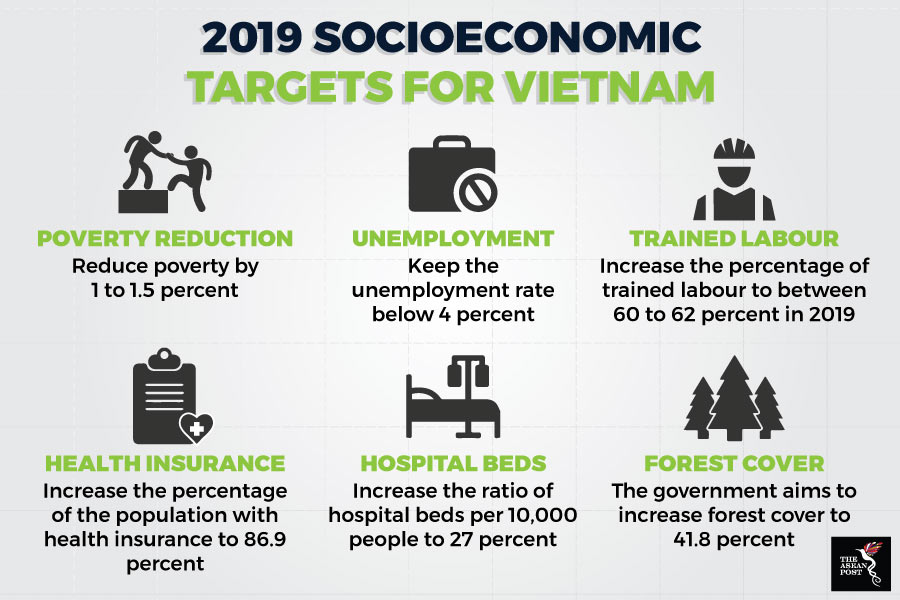This file photo shows the central Vietnamese city of Danang on 11 November, 2017. (Ye Aung Thu / AFP Photo)
2018 was a great year for Vietnam’s economy.
The country’s business environment grew tremendously at the start of the year with over 26,000 new enterprises established. In addition to that, the government there highlighted that foreign direct investment (FDI) disbursement reached over US$3.8 billion in the first three months of the year, up 7.2 percent from 2017. Overall, the socialist state’s gross domestic product (GDP) grew by 7.1 percent year on year in the first six months of 2018 – the fastest growth recorded since 2011.
Among the best performing sectors was manufacturing, with an output growth of 13 percent in the first half of the year. Despite the ongoing trade war between the United States (US) and China, Vietnam’s exports soared. The Communist state recorded export revenues estimated at US$244 billion, an increase of 13.8 percent from the previous year.
Rapid growth
Vietnam’s rapid growth over the past decade is mostly due to the country’s move away from a strict controlled economy to a more liberal system. For the past decade, the country has taken on reforms like deregulation which has seen an influx of private enterprises and foreign investment.
The economic reforms carried out by the Communist Party has made Vietnam one of the region’s fastest growing economies. The World Bank also pointed out in its Global Economic Prospects report that Vietnam is one of six countries in East Asia with real GDP growth of more than six percent.
Source: Vietnam Briefing
In 2018, the government announced further reforms to Vietnam’s economy. Earlier in the year, in an effort to make Vietnam more regionally competitive, Prime Minister Nguyen Xuan Phuc revealed that the country would cut corporate income tax rates from between 20 to 22 percent to 15 to 17 percent. Furthermore, in March, the Ministry of Transport proposed to enhance services in maritime areas and multi-modal transportation by easing business conditions and regulations. If the ministry’s proposal goes through, 314 out of the current 500 regulations will be cut.
Another notable step Vietnam has taken to open up its economy is by signing the Comprehensive and Progressive Agreement for Trans-Pacific Partnership (CPTPP), which the World Bank has estimated will increase Vietnam’s GDP by as much as 3.5 percent.
New targets for 2019
The Communist Party’s General Secretary, Nguyen Phu Trong has called for increased efforts to meet a higher growth rate than 2018. “This will be a heavy task, and all of us must do our utmost to realise this target,” he said.
The targets for 2019 will not just revolve around the country’s GDP, the government has also set various socio-economic goals. For example, it has set a target of reducing poverty by one to 1.5 percent. Last year, the target was between one and 1.3 percent, which the government exceeded at 1.5 percent. Other targets include keeping unemployment below four percent and to increase the percentage of the population with health insurance coverage to 88.1 percent.
Poor political reforms
Despite stellar growth, Vietnam’s political reforms have not really matched the reforms seen in its economy. Rights groups have often criticised Vietnam for its treatment of bloggers and dissidents. According to Human Rights Watch (HRW), the government there convicted and imprisoned at least 27 rights bloggers and activists under various abusive laws in the first six months of 2018.
“Vietnam seems to be contending for the title of one of Asia’s most repressive governments,” said Phil Robertson, deputy Asia director of HRW.
Vietnam has also introduced a new law which came into effect on New Year’s Day which observers say effectively criminalises criticising the government online. The law also allows the government to force internet providers to give them user data when demanded.
Vietnam may be enjoying its highest economic growth in modern times, but reforms are needed to ensure the Communist Party stays accountable. The state has taken great strides to increase the nation’s wealth, but what’s the point of prosperity if its citizens are not free to exercise their rights?

